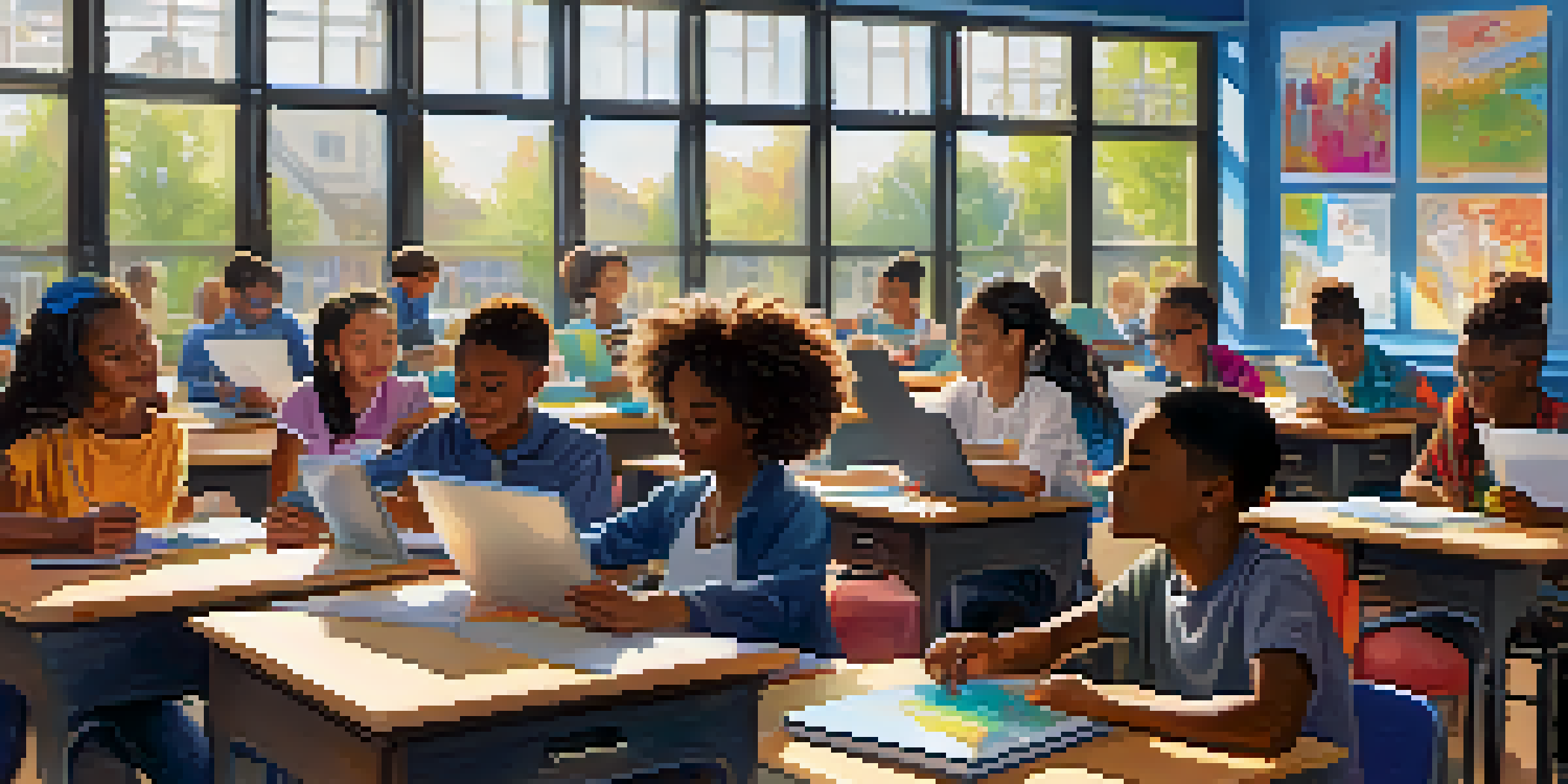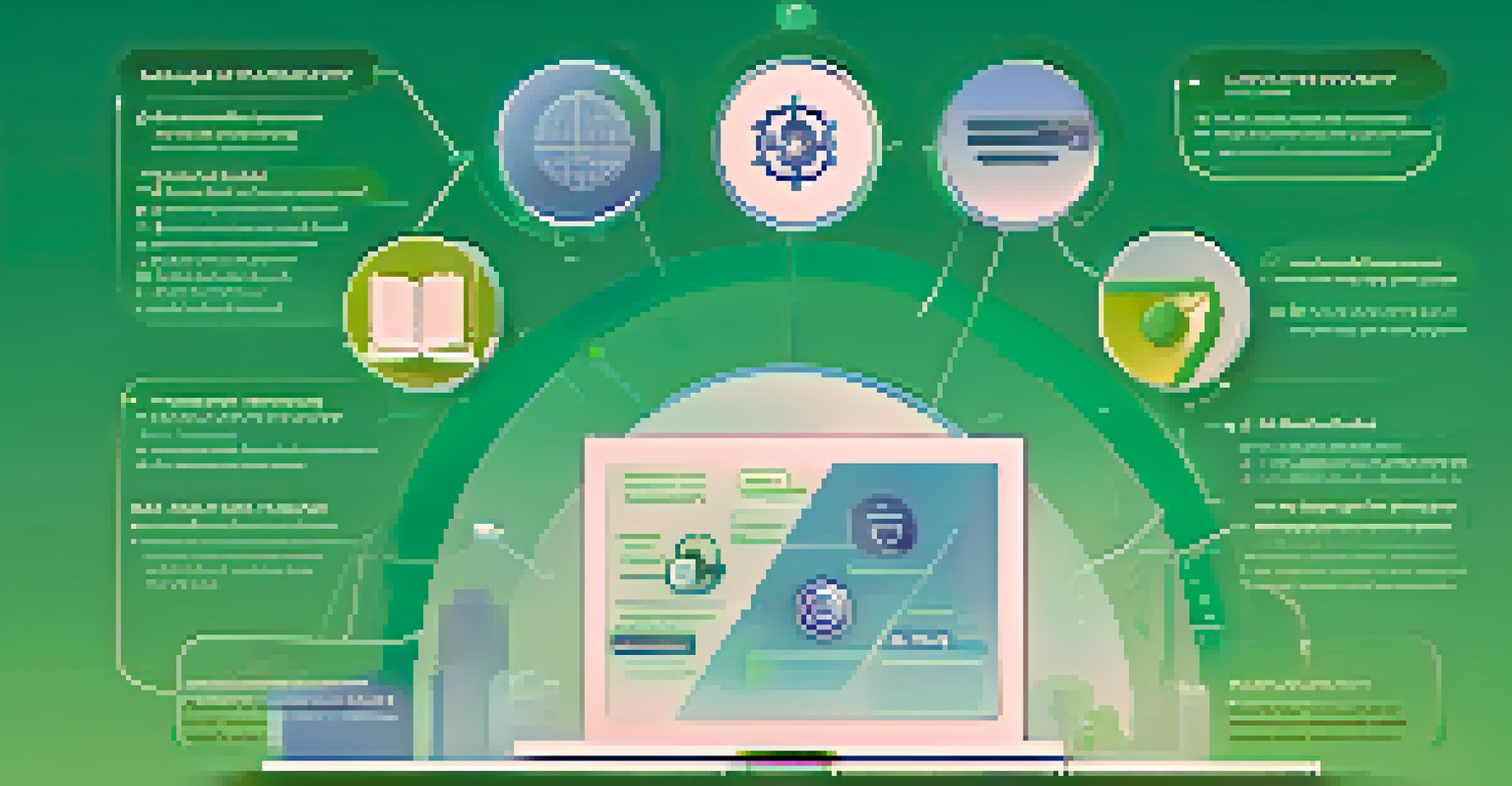Challenges and Solutions in Implementing Adaptive Learning

Understanding Adaptive Learning and Its Importance
Adaptive learning is an educational method that customizes learning experiences based on individual student needs. Imagine walking into a classroom where each student has a unique curriculum tailored just for them; that's the essence of adaptive learning. This personalized approach not only enhances engagement but also boosts retention rates, making learning more effective.
The only thing that interferes with my learning is my education.
The importance of adaptive learning cannot be overstated in today's fast-paced, technology-driven world. As education continues to evolve, traditional one-size-fits-all methods are becoming less effective. By embracing adaptive learning, educators can meet the diverse needs of their students, ensuring that no one gets left behind.
However, implementing this innovative approach does come with its own set of challenges. Understanding these hurdles is crucial for educators and institutions aiming to adopt adaptive learning technologies effectively.
Technological Challenges in Adaptive Learning Implementation
One of the primary challenges in implementing adaptive learning is the technology itself. Many institutions may lack the necessary infrastructure or resources to support sophisticated adaptive learning systems. Outdated hardware or limited internet connectivity can hinder the effectiveness of these programs, making it difficult for educators to deliver personalized content.

Moreover, not all adaptive learning platforms are created equal. Some may not integrate well with existing systems, leading to data silos that can confuse educators and students alike. This lack of compatibility can disrupt the learning experience and create frustration among users.
Adaptive Learning Personalizes Education
Adaptive learning tailors educational experiences to individual student needs, enhancing engagement and retention.
To overcome these technological hurdles, educational institutions need to invest in reliable infrastructure and choose adaptive learning solutions that offer seamless integration. This strategic approach ensures that technology enhances, rather than obstructs, the learning experience.
Resistance to Change Among Educators
Another significant challenge is the resistance to change among educators. Many teachers are accustomed to traditional teaching methods and may feel overwhelmed by the prospect of adopting new technologies. This hesitation can stem from a lack of training or fear of losing control over their classrooms.
Education is not the filling of a pail, but the lighting of a fire.
To address this issue, professional development and training programs are essential. Schools should invest in comprehensive workshops that not only familiarize educators with adaptive learning tools but also highlight their benefits. When teachers see how adaptive learning can enhance their teaching and student outcomes, they are more likely to embrace the change.
Creating a supportive culture that encourages experimentation and collaboration can also help ease this transition. By fostering an environment where teachers feel valued and supported, institutions can mitigate resistance and cultivate enthusiasm for adaptive learning.
Data Privacy and Security Concerns
In today's digital age, data privacy and security are paramount concerns for both educators and students. Adaptive learning systems often collect vast amounts of personal information to tailor learning experiences, which raises questions about how this data is stored and used. Parents and students may be wary of sharing sensitive information, fearing potential breaches.
To alleviate these concerns, educational institutions must prioritize data security measures. Implementing robust encryption protocols and ensuring compliance with regulations like FERPA can help build trust with users. Transparency about data usage and privacy policies is also crucial in reassuring parents and students.
Tech Challenges in Implementation
Institutions often face technological hurdles, such as outdated infrastructure and compatibility issues, in adopting adaptive learning systems.
By taking proactive steps to protect user data, schools can foster a safe learning environment that encourages the adoption of adaptive learning technologies.
Identifying Individual Learning Needs
A significant challenge in adaptive learning is accurately identifying the individual learning needs of each student. With diverse backgrounds and varying levels of understanding, pinpointing where each learner stands can be complex. Misdiagnosis of a student's needs can lead to ineffective learning paths and frustration.
To tackle this challenge, educators can utilize diagnostic assessments and analytics to gather insights into student performance. These tools can help identify gaps in knowledge and skills, enabling tailored learning experiences. Moreover, continuous monitoring and feedback allow for adjustments in real time, ensuring that students remain on track.
Collaboration among educators, parents, and students is also vital in this process. By fostering open communication, schools can gather valuable insights that contribute to more accurate assessments of learning needs.
Balancing Personalized Learning and Standardization
Finding the right balance between personalized learning and standardization is another challenge in adaptive learning. While it's essential to tailor learning experiences to individual needs, maintaining a consistent curriculum is equally important for assessment and accountability. Striking this balance can be tricky for educators and institutions.
To achieve this, schools can develop a framework that incorporates both personalized and standardized elements. For example, setting baseline standards that all students must meet while allowing flexibility in how they achieve those standards can create a harmonious learning environment.
Data Privacy is a Major Concern
With adaptive learning systems collecting personal data, ensuring data privacy and security is essential for building trust among users.
Engaging stakeholders, including teachers and administrators, in the development of this framework ensures that it meets the needs of everyone involved. By fostering collaboration, schools can create adaptive learning experiences that are both personalized and aligned with educational goals.
Evaluating the Effectiveness of Adaptive Learning
Evaluating the effectiveness of adaptive learning programs is crucial for continuous improvement. However, measuring success can be challenging due to the nuanced nature of personalized learning paths. Standardized test scores may not fully capture student progress or engagement, leading to incomplete assessments.
To address this, educators can employ a variety of evaluation methods, including formative assessments, student feedback, and observational data. This multi-faceted approach provides a more holistic view of how adaptive learning impacts student outcomes.

Additionally, fostering a culture of reflection among educators allows for ongoing evaluation and adaptation of teaching methods. By regularly reviewing and refining adaptive learning strategies, schools can ensure they are meeting the evolving needs of their students.